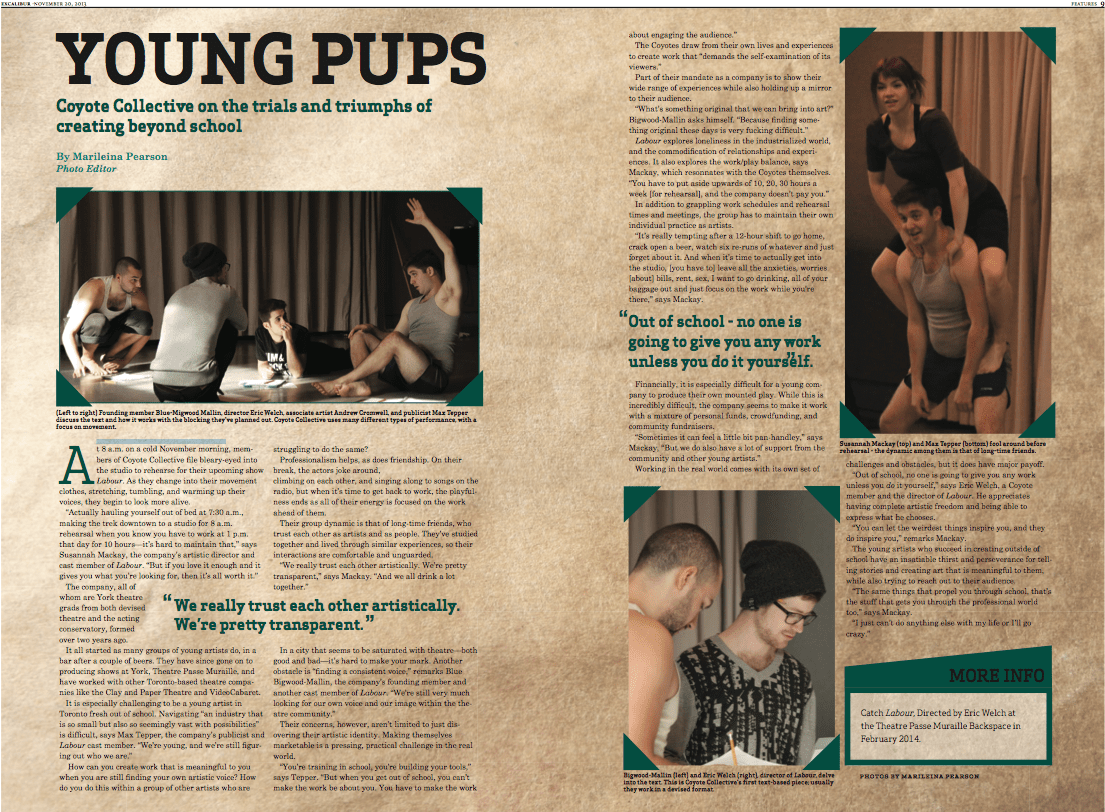At 8 a.m. on a cold November morning, members of Coyote Collective file bleary-eyed into the studio to rehearse for their upcoming show Labour. As they change into their movement clothes, stretching, tumbling, and warming up their voices, they begin to look more alive.
“Actually hauling yourself out of bed at 7:30 a.m., making the trek downtown to a studio for 8 a.m. rehearsal when you know you have to work at 1 p.m. that day for 10 hours—it’s hard to maintain that,” says Susannah Mackay, the company’s artistic director and cast member of Labour. “But if you love it enough and it gives you what you’re looking for, then it’s all worth it.”
How can you create work that is meaningful to you when you are still finding your own artistic voice? How do you do this within a group of other artists who are struggling to do the same?
Professionalism helps, as does friendship. On their break, the actors joke around, climbing on each other, and singing along to songs on the radio, but when it’s time to get back to work, the playfulness ends as all of their energy is focused on the work ahead of them.
“We really trust each other artistically. We’re pretty transparent,” says Mackay. “And we all drink a lot together.”
In a city that seems to be saturated with theatre—both good and bad—it’s hard to make your mark. Another obstacle is “finding a consistent voice,” remarks Blue Bigwood-Mallin, the company’s founding member and another cast member of Labour. “We’re still very much looking for our own voice and our image within the theatre community.”
“You’re training in school, you’re building your tools,” says Tepper. “But when you get out of school, you can’t make the work be about you. You have to make the work about engaging the audience.”
The Coyotes draw from their own lives and experiences to create work that “demands the self-examination of its viewers.”Part of their mandate as a company is to show their wide range of experiences while also holding up a mirror to their audience.
“What’s something original that we can bring into art?” Bigwood-Mallin asks himself. “Because finding something original these days is very fucking difficult.”
Labour explores loneliness in the industrialized world, and the commodification of relationships and experiences. It also explores the work/play balance, says Mackay, which resonnates with the Coyotes themselves. “You have to put aside upwards of 10, 20, 30 hours a week [for rehearsal], and the company doesn’t pay you.”
In addition to grappling work schedules and rehearsal times and meetings, the group has to maintain their own individual practice as artists.
“It’s really tempting after a 12-hour shift to go home, crack open a beer, watch six re-runs of whatever and just forget about it. And when it’s time to actually get into the studio, [you have to] leave all the anxieties, worries [about] bills, rent, sex, I want to go drinking, all of your baggage out and just focus on the work while you’re there,” says Mackay.
“Sometimes it can feel a little bit pan-handley,” says Mackay, “But we do also have a lot of support from the community and other young artists.”
Working in the real world comes with its own set of challenges and obstacles, but it does have major payoff. “Out of school, no one is going to give you any workunless you do it yourself,” says Eric Welch, a Coyote member and the director of Labour. He appreciates having complete artistic freedom and being able to express what he chooses.
“The same things that propel you through school, that’s the stuff that gets you through the professional world too,” says Mackay.
“I just can’t do anything else with my life or I’ll go crazy.”
Marileina Pearson
Photo Editor



